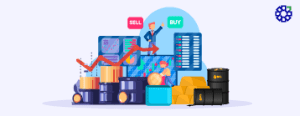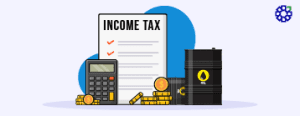What is NCDEX?
- 18th August 2025
- 12:00 AM
- 7 min read
Ever thought that you could trade wheat and spices on a stock exchange? You can do it from the NCDEX. Now, what is NCDEX? The NCDEX form stands for National Commodity and Derivatives Exchange Limited. It is an Indian commodity exchange that primarily focuses on agricultural products.
For market expansion, NCDEX plans to invest INR 750 crore, starting with cash offers. This action gives a competitive edge to NCDEX against competitors like MSE.
Continue reading to learn more about this exchange.
The History and Evolution of NCDEX
On April 23, 2003, NCDEX was created, and on December 15, 2003, the exchange began its operations. Major organisations such as the National Stock Exchange (NSE), ICICI Bank, CRISIL, National Bank for Agriculture and Rural Development (NABARD), and Life Insurance Corporation (LIC) are among the founding members of this exchange.
An important factor in the expansion of agricultural trade in India has been the NCDEX. It has emerged as an entirely computerised and technologically advanced exchange. It has helped with fair pricing discovery, risk management, and the introduction of many products throughout the years.
The NCDEX exchange is utilised by numerous traders, farmers, and investors. NCDEX has introduced trading products such as futures, options, and indices in the Indian agricultural market to further streamline the trading process.
What is the Role of NCDEX?
The NCDEX acts as an intermediary between farmers and buyers. There are a lot of factors that influence the prices of agricultural products, including drought, storms, and delayed monsoons.
A farmer who expects a price decline may use a futures contract to secure financial stability and reduce possible losses. This enables them to sell their goods at a fixed price at a later time. NCDEX plays a pivotal role in allowing these trades.
Types of Commodities Traded on the NCDEX
Since you have a brief knowledge of the NCDEX meaning, let us explore the different types of commodities that can be traded on NCDEX:
- Agricultural commodities like wheat, corn, guar seed, guar gum, and paddy.
- Spices include coriander, turmeric, cumin, and pepper.
- Pulses and oilseeds like castor seed, mustard seed, Chana, and Bajra.
- Cotton and sugar.
How Does NCDEX Operate?
Being an exchange for agricultural commodities, the NCDEX brings together buyers and sellers of various agricultural products. Market players can purchase and sell derivative contracts of different agricultural goods through the NCDEX.
The NCDEX offers a simplified trading experience in such a way that traders, farmers, and investors can use registered brokers to make purchase and sell orders. However, supply and demand play a major role in determining a commodity’s price discovery.
All transactions completed on NCDEX are cleared and settled by the National Commodity Clearing Limited (NCCL). All trades are settled by the NCCL on a gross basis for delivery settlements and a net basis for daily settlements. When a non-defaulting party incurs losses or a defaulting party pays in money or products, the NCCL also offers compensation to its clearing members.
How Can You Start Trading in NCDEX?
Trading on NCDEX is very simple. Follow the steps below to start trading in NCDEX:
- Open a commodity trading account with a broker who is registered with NCDEX.
- Provide the required documents and finish the KYC procedure. You must submit bank statements, Aadhaar card, and PAN card details.
- Deposit the margin funds to start trading on NCDEX.
- Choose a commodity and the instrument of your choice to trade after depositing the margin funds.
- Place your buy or sell order.
- Monitor your holdings and employ efficient risk management techniques.
You can open a Demat and trading account with PL Capital Group – Prabhudas Lilladher. PL offers you numerous powerful tools and research-backed trading strategies.
NCDEX Trading Tools
Futures and options are examples of derivative products that may be used to trade commodities on the NCDEX:
- You can use a futures contract for trading agricultural commodities, which is considered the most popular tool.
- You may use an options contract to trade only a few commodities.
The price changes of 10 agricultural commodities are tracked by the NCDEX index. Each commodity is given equal weight in the index, which monitors the spot prices of the commodities.
The current quote or the price at which a commodity may be delivered right now is known as the spot price. The futures price of a commodity represents its projected future worth.
Advantages of Trading in NCDEX
-
Hedging
NCDEX trading aids farmers to hedge against potential risks and losses.
-
Lower Costs
NCDEX has reduced the price of data for farmers by ta0king out middlemen, who previously controlled the market information. This empowers farmers by giving them direct access to trade insights.
-
Price Discovery
NCDEX allows farmers to trade on an efficient platform to discover the prices of agricultural commodities.
-
Transparency
By enabling market transparency, NCDEX has given Indian farmers year-round access to information on crop prices.
-
Improved Agricultural Practice
NCDEX plays a pivotal role in developing improved agricultural practices in India. This exchange has increased the overall quality awareness by implementing quality requirements.
NCDEX Regulations and Governance
Under the Commodity Derivatives Market Regulation, the Securities and Exchange Board of India (SEBI) oversees the NCDEX. In order to maintain openness and stop fraud, the SEBI is essential to the exchange’s governance. SEBI guidelines protect the interests of market players while assisting exchanges in maintaining a fair pricing structure. To facilitate trading and settlement, the NCDEX has standardised the size of contracts transacted.
NCDEX vs MCX – Key Differences
Like NCDEX, there is another commodity exchange in India, which is known as the Multi-Commodity Exchange (MCX). Here are the key differences between the NCDEX and MCX:
| Parameters | NCDEX | MCX |
| Types of Commodities | Agricultural commodities | Energy, metals, and some agricultural products |
| Popular Commodities | Wheat, soybean, mustard seed, spices | Gold, silver, crude oil, natural gas, copper |
| Regulator | SEBI | SEBI |
| Trading Volume | Lower than MCX | Higher volume |
| Hedgers / Users | Farmers, traders, agricultural companies, and food processors | Industrial users, bullion traders, and energy companies. |
Final Thought
The NCDEX plays a vital role in Indian agricultural trading. The exchange assists investors, farmers, and traders in finding new opportunities and hedging their positions. The exchange appears to have a promising future due to developments in technology and accommodating government regulations.
You can use the PL Capital trading account to trade commodities in NCDEX. PL Capital provides a variety of features, such as smart alerts and real-time market scanners.
Frequently Asked Questions
1. What is the full form of NCDEX?
The NCDEX full form stands for National Commodity and Derivatives Exchange Limited.
2. Which are the most traded commodities on NCDEX?
Cottonseed oilcake, guar seed, and guar gum are some of the commodities that are traded the most on the NCDEX.
3. Who regulates NCDEX?
The National Commodity & Derivatives Exchange (NCDEX) is regulated by the Securities and Exchange Board of India (SEBI). SEBI oversees its operations, ensures compliance with trading regulations, and maintains transparency and fairness in the commodity derivatives market.





